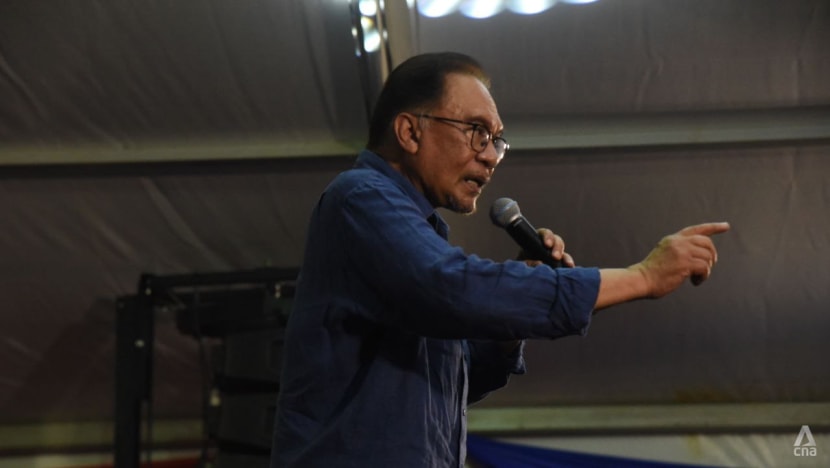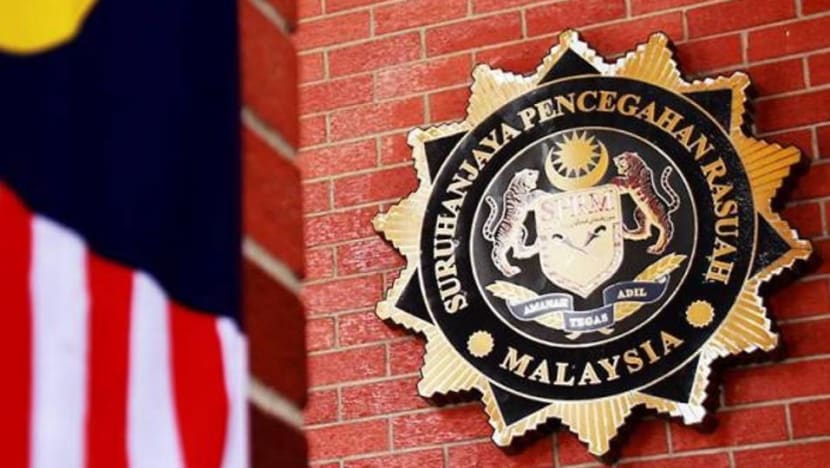Analysis: Malaysia's anti-graft campaign appears to be picking up steam. Or is it really?
Despite a slew of headline-grabbing shakedowns by the Malaysian authorities, the country’s anti-graft campaign continues to be beleaguered with setbacks.

KUALA LUMPUR: Malaysia’s anti-graft campaign, the cornerstone of Prime Minister Anwar Ibrahim’s nine-month administration, appears to be in overdrive.
During a multi-agency raid in late July, national graft busters temporarily detained a flashy and high-profile show business promoter after weeks of surveillance that culminated with the spectacular seizures of cash, gold bars, and luxury vehicles.
Weeks later, the personal accounts of opposition leader Hamzah Zainuddin, from the Parti Pribumi Bersatu Malaysia (Bersatu), and several of his family members were frozen by the inland revenue agency.
Then came the decision by the Malaysia police to place the son-in-law of former premier Muhyiddin Yassin and his lawyer on the Interpol Red Notice. The duo are being investigated for alleged offences of money laundering.
But against these headline-grabbing shake-downs by the authorities, the anti-graft campaign has also been dealt with setbacks.
One example is the decision by a High Court judge on Aug 15 to dismiss power of abuse charges against Mr Muhyiddin over the misallocation of millions of dollars in the award of contracts during the pandemic.
The court ruled that the indictment framed by the Attorney General’s Chambers was defective and the matter is now in the appeal process. Mr Muhyiddin remains on trial for several other corruption charges.
“Here is a government that has been screaming about tackling corruption for so many years when it was in opposition. But once you are in power and nothing appears to be changing, the blowback is going to be on (PM) Anwar,” Mr Nur Jazlan Mohamed, who is the deputy president of the Senate and a former deputy Home Minister, tells CNA.
Seasoned watchers of Malaysia note that PM Anwar faces a tricky balance in his pledge to deliver reforms because of the country’s unsteady politics.
“Anwar has to satisfy his own base who want to see reform and are wary of compromises,” says Mr Manu Bhaskaran, founding director and Chief Executive Officer of Centennial Asia Advisors.
“Yet, he would not be able to even make a beginning on reforms if his coalition does not survive and for that survival, some compromises are necessary in the real world of messy politics.”
The perceived slow pace of reforms, particularly in Mr Anwar’s promised crackdown on widespread graft, has triggered criticism of administrative inertia in government from critics and frustration from ordinary Malaysians supportive of the Pakatan Harapan ruling coalition.
Mr Nur Jazlan, who is a senior politician from the United Malays National Organisation (UMNO), acknowledges that decades of heavy political interference in the country’s watchdog agencies, including the Malaysian Anti-Corruption Commission (MACC) and the Attorney General’s office, require urgent government attention.
“All agencies, including the police, need to cooperate (in the anti-graft agenda) but first weaknesses in these arms of government must be ironed out,” he says.
Malaysians are generally discouraged by the anti-graft campaign because crackdowns that receive wide publicity in the media very rarely end up in the courts.

One case that is being closely watched is the late July multi-agency raid on affairs of Abdul Malik Dasthigeer, the founder and chairman of the Malik Group of Companies that is involved in organising concerts by performers from India and the recruitment of foreign workers.
In the raid, officers from several watchdog agencies led by the MACC seized around RM38 million (US$8.1m), 200 kilograms of gold and several luxury sports cars. Mr Abdul Malik is now on bail and has yet to be charged in court.
Separately, the political dimension involving watchdog agencies has also come under the public spotlight.
In recent days, media attention has focussed on the leaks of legal opinions by public prosecutors discouraging the Attorney General’s Chambers from proceeding with the corruption prosecutions against jailed former premier Najib Razak in the 1Malaysia Development Bhd (1MDB) scandal.
Similar legal opinions from the public prosecutors involving Ahmad Zahid Hamid, who is one of the two deputy premiers of the Anwar government and is currently on trial on charges of money laundering and the abuse of power, have also surfaced.
Leaders from UMNO, which is a junior member in Mr. Anwar’s coalition government, have chimed in on these leaked documents and are demanding that the Attorney General intervene.
“If the memo is genuine, I am confident that the Attorney General’s Chambers will immediately drop the charges,” Mr Ahmad Zahid, who is the current UMNO president, was quoted as saying by the local media.
But lawyers have argued that disagreements among prosecutors in the Attorney General’s Chambers are not uncommon in high-profile cases.
Mr Walter Sandosam, a former member of the MACC oversight panel, noted in a recent commentary to the FMT news website that the final call rests with the Attorney General, “even if his officers have their own take on whether a case being considered for prosecution lacks substance”.
“The layman must understand this. Cease barking at the moon,” noted Mr Sandosam.









.jpg?itok=KH7Fi6Gp)







